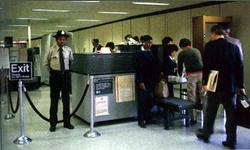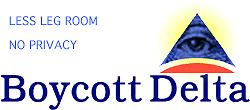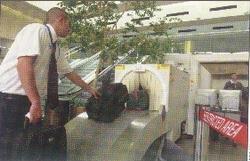Revised CAPPS II Called "Less Intrusive"
 I'm just another consensus on the street
I'm just another consensus on the street
Gonna cruise out of this city
Head down to the sea
Gonna shout out at the ocean
Hey it's me
And I feel like a number
Feel like a number
Feel like a stranger
A stranger in this land
I feel like a number
I'm not a number
I'm not a number
Dammit I'm a man
I said I'm a man
-Bob Seger, "Feel Like A Number"
Before you board a commercial flight, the government wants to
know it has your number. It's been that way ever since
Sept. 11, 2001. But under a new plan described in Saturday's
Washington Post, the government may decide it wants to
know just a little less about you than before.
 CAPPS II, a plan controversial since its
inception, was to use government computers, private databases (such
as credit bureau information), courthouse records and even
artificial intelligence to predict which passenger might pose a
threat to air travel. The information gathered would have been on
the books for up to 50 years.
CAPPS II, a plan controversial since its
inception, was to use government computers, private databases (such
as credit bureau information), courthouse records and even
artificial intelligence to predict which passenger might pose a
threat to air travel. The information gathered would have been on
the books for up to 50 years.
The system was so controversial that it sparked more than 200
letters to the TSA from influential organizations and individuals
protesting the highly intrusive nature of the second-generation
Computer Assisted Passenger Prescreening System (CAPPS II).
That Ain't Gonna Fly
 Now, the Post reports those involved in
the original concept no longer work for the agency. CAPPS II itself
has been modified to be less intrusive - "kinder and gentler," to
coin a phrase. The Post reports it will depend on
commercial databases rather than government computer information.
Passenger identities will be confirmed using a mathematical program
developed by the TSA itself. The successor to CAPPS II will still
assign a "risk score" to each passenger, indicating the likelihood
that a passenger is who he says he is and whether he has verifiable
roots in the community where he claims to live.
Now, the Post reports those involved in
the original concept no longer work for the agency. CAPPS II itself
has been modified to be less intrusive - "kinder and gentler," to
coin a phrase. The Post reports it will depend on
commercial databases rather than government computer information.
Passenger identities will be confirmed using a mathematical program
developed by the TSA itself. The successor to CAPPS II will still
assign a "risk score" to each passenger, indicating the likelihood
that a passenger is who he says he is and whether he has verifiable
roots in the community where he claims to live.
Details of the new plan are expected to be published in the
Federal Register next week. A draft of the document, obtained by
the Post, indicates the TSA will clearly define and narrow
the information gathered, how it is used and who gets to see
it.
 "We
care about those issues, and we're addressing them," one senior
government official said in an interview with the Washington
newspaper.
"We
care about those issues, and we're addressing them," one senior
government official said in an interview with the Washington
newspaper.
Back in March, the TSA and Delta Airlines launched a secretive
test of CAPPS II v.1 at three undisclosed airports across the
country. When asked about the results of the testing, neither Delta
nor the TSA would comment. Also in March, the American Civil
Liberties Union (ACLU) issued a statement saying those of us who
are less than rich or who have less than perfect credit scores
would be unfairly targeted by CAPPS.
New Leadership, Softer Attitude
The CAPPS II program - or whatever it becomes - is now led by a
new group in the Office of National Risk Assessment. The group
describes itself as "privacy-centric," influenced by "issues raised
in the comments received, particularly the accuracy, efficiency,
and privacy impact of the proposed CAPPS II system."
 "A little glimmer of faith in the U.S. government
has been restored to me," said Bill Scannell, whose website, boycottdelta.org,
targeted the airline for its cooperation with the CAPPS II program.
"It's nice to know that there are now people within Homeland
Security that have taken the time to read the Bill of Rights. They
are going back to square one and are doing now what they should
have done before: to see if it's even possible to devise a
passenger screening system that will not only work, but not destroy
our rights as Americans in the process."
"A little glimmer of faith in the U.S. government
has been restored to me," said Bill Scannell, whose website, boycottdelta.org,
targeted the airline for its cooperation with the CAPPS II program.
"It's nice to know that there are now people within Homeland
Security that have taken the time to read the Bill of Rights. They
are going back to square one and are doing now what they should
have done before: to see if it's even possible to devise a
passenger screening system that will not only work, but not destroy
our rights as Americans in the process."
 Still, CAPPS II is fast turning into the biggest
domestic surveillance system ever created by the federal
government. It will require passengers to disclose their full
names, home addresses, telephone numbers and birthdates. The
details will be fed into commercial databases like Lexis-Nexis and
Acxiom. The system then uses those gee-whiz TSA math models and
other methods to assess the passenger's threat potential and report
back to the government. After that, the commercial database
providers would not be allowed to keep any of the information "in a
commercially usable form," according to the draft obtained by the
Post. It's not yet clear whether this information will be
archived by the data providers, nor is it clear how long that
information will remain on file.
Still, CAPPS II is fast turning into the biggest
domestic surveillance system ever created by the federal
government. It will require passengers to disclose their full
names, home addresses, telephone numbers and birthdates. The
details will be fed into commercial databases like Lexis-Nexis and
Acxiom. The system then uses those gee-whiz TSA math models and
other methods to assess the passenger's threat potential and report
back to the government. After that, the commercial database
providers would not be allowed to keep any of the information "in a
commercially usable form," according to the draft obtained by the
Post. It's not yet clear whether this information will be
archived by the data providers, nor is it clear how long that
information will remain on file.

Privacy advocates are still skeptical about the impact such a
system will have on the everyday lives of people who have nothing
to do with terrorism or threats to the national transportation
infrastructure. Lara Flint, staff counsel at the Center for
Democracy and Technology, said she welcomes the announcement but
wants to "see proof they're standing by the commitments they have
made. It's important that TSA go forward with an open process in
order to gain trust."
Suing The TSA
Last Wednesday, the Electronic Privacy Information Center (EPIC)
filed a lawsuit against
the federal government, citing the Freedom of Information Act in a
request for details on just how CAPPS II v.2 will impact civil
liberties. EPIC's general counsel, David Sobel, tells the
Post questions include how the government will deal with
innacurate information, a long-time problem in private databases
such as credit bureaus.

"Millions of air passengers may soon have vast amounts of their
personal data scrutinized by CAPPS II," Sobel said in a prepared
statement. "It is time for the government to be more forthcoming
about this system and its likely impact on privacy rights."
 ANN's Daily Aero-Linx (06.29.25)
ANN's Daily Aero-Linx (06.29.25) ANN's Daily Aero-Term (06.29.25): Gross Navigation Error (GNE)
ANN's Daily Aero-Term (06.29.25): Gross Navigation Error (GNE) Classic Aero-TV: Anticipating Futurespace - Blue Origin Visits Airventure 2017
Classic Aero-TV: Anticipating Futurespace - Blue Origin Visits Airventure 2017 NTSB Final Report: Cirrus SR22
NTSB Final Report: Cirrus SR22 Airborne Affordable Flyers 06.26.25: PA18 Upgrades, Delta Force, Rhinebeck
Airborne Affordable Flyers 06.26.25: PA18 Upgrades, Delta Force, Rhinebeck









